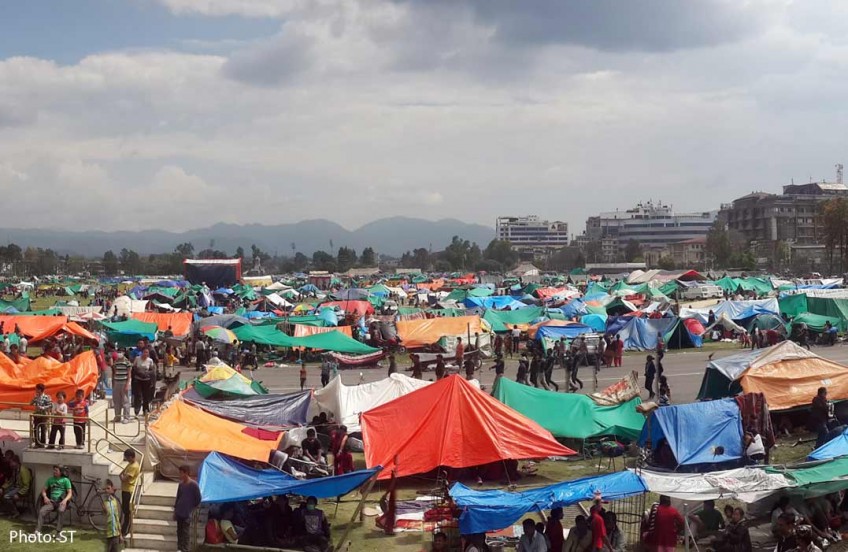Patients too scared to stay inside hospital

KATHMANDU - At the 250-bed B&B Hospital in Kathmandu, patients can be found lying in the carpark or under the porch.
The reason is not overcrowding but panic, said Dr J. L. Baidya, managing director and chief surgeon at the private orthopaedic hospital.
A government official had gone to the hospital on Sunday and told its staff to take precautions because a magnitude-9 earthquake could strike, he explained.
Although it turned out to be a completely groundless rumour, the patients and their relatives were so spooked that they refused to stay indoors.
"We had to rig up a makeshift operating theatre in the carpark. To do basic life-saving operations, even amputations, we had to wheel all the machinery out there. Can you imagine?" Dr Baidya told The Straits Times in the forecourt of the hospital, surrounded by patients.
Ironically, he said, the entire intensive care unit on the third floor is now empty. Almost all the patients are on the ground floor, if not outside.
"This has created a problem not only for the patients but also for the doctors and nurses, because the patients are now scattered in different places around the hospital," he added.
Like others in the city, the hospital is operating at full capacity with its staff working 24-hour shifts.
About 128 earthquake victims were taken to the hospital after last Saturday's 7.8-magnitude quake. Ten were already dead on arrival, said the hospital's registrar, Dr Philip Shyam Ranjit.
The hospital would soon run out of medicine, including antibiotics and painkillers, hospital officials said. There has been no help yet from the government, they added.
"But more than our needs, the problem is this panic," Dr Baidya said.
Dr Ranjit said the hospital has had to turn away quake victims, but would offer primary care where necessary. It was also giving out medicine free of charge.
"There are big problems," he said. "We don't have electricity; we are running on generators and, for that, we have to find and buy diesel.
"Till now, there has been no assistance from the government, though yesterday, officials came and took notes of what we need."
The Nepal Red Cross has supplied some tents, he said, but the hospital's stocks of antibiotics and painkillers are running low.
Nearby, at the sprawling old parade ground called Tundhikhel, a tent city has sprung up since last Saturday afternoon.
Colonel Prayog Rana of the Nepalese army arrived only yesterday to take charge. Tents and field toilets have been hastily erected for the 3,000 to 4,000 people there.
"We aim to put up 50 tents," he told The Straits Times.
Among the motley crowd at Tundhikhel is Ms Neesha Bhattarai, 18, who moved there with her parents, brother and younger sister following a powerful aftershock on Sunday.
"Our house in Bhothahiti cracked during the earthquake," she said. "Everyone was running around and there was nobody to help us, so we came here on Saturday and returned home on Sunday - but then, there was the big aftershock. So we decided to move here," she said.
"The aftershock was scary," she added. "And then it was raining all night."
She said she was glad the army was in charge.
Col Rana said: "We need food mostly, and then water, and sanitation and hygiene.
"A committee has been formed to coordinate all this. There is actually plenty of water, but coordination is a problem."
nirmal@sph.com.sg

This article was first published on April 28, 2015.
Get a copy of The Straits Times or go to straitstimes.com for more stories.